Americans should Decentralize both Government and Economy
Neither Left or Right
Today we have strong movements on both the left and the right that are focused on either big government or large corporations. On the left, we have established liberals and anti-capitalist ideologues attacking Wall Street but unwilling to reform the Fed because they simply want to seize power and take over the economy. On the right, we have large corporations interested, for reasons of improving their bottom line, gobbling up smaller companies and controlling government and its regulatory agencies as much as possible through lobbying efforts that change laws to stack the deck further in their favor. Neither of these groups, which financially control the Democratic and Republican Parties respectively, are interested in the well-being of the United States or its citizens. Neither of these groups are proposing a system of legitimate or sustainable government.
Reacting against this corrupt society are citizens who, after losing their jobs and houses, are beginning to realize that the ruling elites in Washington are neither representing the citizens, who are doing the work and paying the bills of the country, nor the principles of good governance established in the U.S. Constitution. On the grassroots left we have the Huffington Post that is more fixated on economic reform, the end of corruption, and decentralization of the economy. On the grassroots right, you have the Tea Party movement focused on making government smaller because of the out-of-control growth of a Leviathan. These grassroots groups are the decentralizing counterparts of their centralizing counterparts on the left and the right. But, like their counterparts they seek reform of either the economy or the government, rather than seeing the centralizing power has to be removed from both the government and the economy.
The new TEA Party
The TEA Party movement, at the present time contains a wide-ranging assembly of people on both the left and the right—but primarily on the right—that want real change, change that returns the United States back to the people. Various people with have been seeking to co-opt the Tea Party movement and harness and direct its power for their own agendas. Perhaps no group has tried harder than big government Republicans. But the Tea Party movement is facing a very similar situation to the time of the Boston Tea Party, when BOTH big government, under the control of George III, and big corporations such as the East India Tea Company consolidated both political and economy power at the expense of the average citizen.
Can Robert Reich, Ron Paul, the Huffington Post, and the Cato Institute adopt a common higher vision?
It is time for people like Robert Reich, Arianna Huffington, the Cato Institute, and Ron Paul to realize that they share a common enemy in the combination of consolidated economic power and political power. The grassroots left should realize that the present government structure is incapable of reforming the economy because neither passing more regulatory legislation nor instituting socialism will create the government that will solve the problem of centralized capital. And, Ron Paul and the Cato Institute need to realize that an ideological libertarianism that promotes economy anarchy will not create a free economy, but lead to bigger economic powers swallowing up little ones.
The economy has to be a free as a good highway system. Laws are required for a good free flowing highway system to prevent big trucks from controlling the road, or to prevent the politicians or the rich from using the highways for themselves through laws or fees. We need laws where a decentralized and free flowing economy is the goal, so every citizen has more economic opportunity.
Life, Liberty, and the Pursuit of Happiness, Version 4.0
 We need a revolution that takes us back to the sound principles of governance embodied in the Constitution and the application of those principles to contemporary social conditions very different from the 18th Century. My book Life, Liberty, and the Pursuit of Happiness, Version 4.0 explains why and points toward how this can be done.
We need a revolution that takes us back to the sound principles of governance embodied in the Constitution and the application of those principles to contemporary social conditions very different from the 18th Century. My book Life, Liberty, and the Pursuit of Happiness, Version 4.0 explains why and points toward how this can be done.
- Government’s role is to create fair economic playing field, not tax incentives, grants or exceptions to particular businesses.
- Pass an Amendment: “Congress shall Make No Law Establishing a Business, or Preventing the Free Exercise thereof.” Analogous to separation of government and culture in the First Amendment.
- Perhaps tax mergers and acquisitions.
- Change stock rating system to include the following: Stock cannot get “A” rating unless it pays a 6% dividend, a “B” rating 4%, a “C” rating 2%.
- Abolish regulatory agencies as they exist (fox in henhouse) recommendation here:
- https://blog.ganderson.us/2010/05/gulf-oil-spill-another-indication-of-the-need-for-regulatory-reform/
- https://blog.ganderson.us/2010/04/reforming-regulatory-agencies/
- Eliminate all corporate income tax. Tax executive salaries and dividends paid to individuals only.
- Transfer collection of all income taxes to states (requires transition).
- No income tax on earnings under $50,000 per person, $100,000 per married couple.
- National sales tax to make US products more competitive.
- Eliminate combined legislation which allows special interest legislation to get added to bills.
Some of these proposals are not readily intuitive, but if you understand the principles of good governance tested by 3,000 years of human experience as I outlined in my book, you will see why some of these proposals—and others that follow from the application of principles, not patches on problems—make sense.


Comments
Americans should Decentralize both Government and Economy — No Comments
HTML tags allowed in your comment: <a href="" title=""> <abbr title=""> <acronym title=""> <b> <blockquote cite=""> <cite> <code> <del datetime=""> <em> <i> <q cite=""> <s> <strike> <strong>